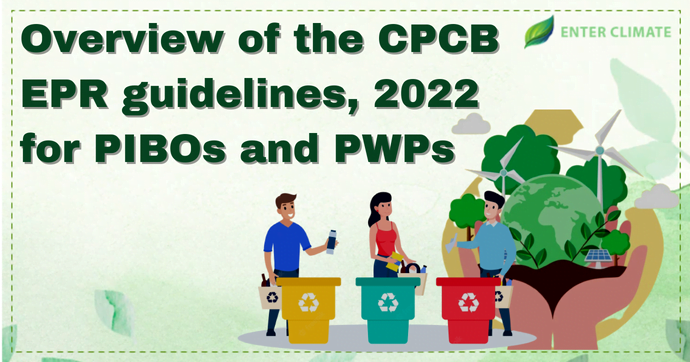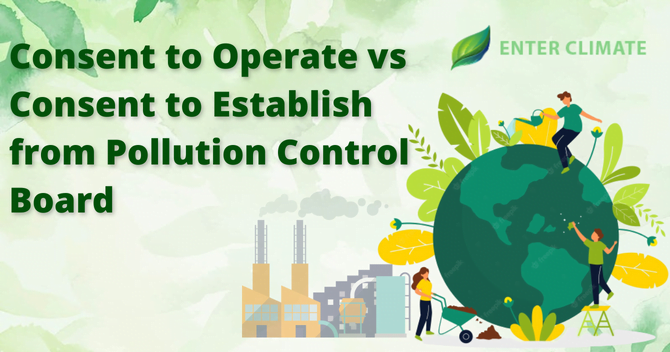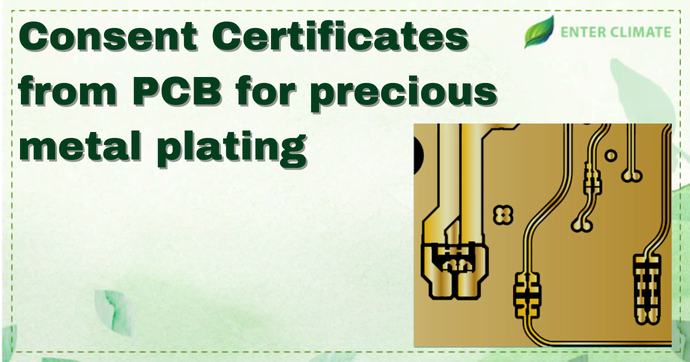Overview of the CPCB EPR guidelines, 2022 for PIBOs and PWPs
 28 Dec, 2022
28 Dec, 2022 
The Ministry of Environment, Forest and Climate Change, Government of India, in the 2022 Amendment to the Plastic Waste Management Rules, notified ‘Guidelines on Extended Producer Responsibility for Plastic Packaging’ in the Schedule II of the Rules. On 21 December 2022, CPCB issued a circular to producers, importers and brand owners (PIBOs)and plastic waste processors (PWPs) under Section 5 of the Environment (Protection) Act, 1986, related to Provisions of GST invoice transactions related to plastic packaging. In the CPCB EPR guidelines, 2022, the producer, importers and brand owners, as well as the PWPs, have been directed to upload GST E- invoices and details of all transactions of sale and purchase related to plastic packaging and plastic waste on the centralised EPR portal for ensuring compliance to the provisions.
What are the CPCB EPR guidelines, 2022, for PIBOs and PWPs?
The centralised EPR portal for Plastic Packaging provides provision for the registration of PIBOs/ PWPS by the notified CPCB EPR guidelines, 2022. This portal commenced operation in April 2022 with two modules for registration of PIBOs through Module 1 and registration of PWPs through Module 2. Module 1 of the portal has been upgraded to Module 1 A.
PIBOs, at the time of application, must provide the details related to the sale of plastic, its consumption, and procurement. The EPR target for the current operational year needs to be calculated based on information for the last two years and submitted with the application by the provision of the CPCB EPR guidelines, 2022.
For subsequent years, PIBOs must provide real-time information on sales and procurement, based on which EPR target will be auto-generated. Further provision has been made to assess the quantity of recycled plastic used and the reuse of Category I plastic packaging. EPR credits for the same can be generated/carried forward by the PIBOs as per requirement in accordance with the provision of CPCB EPR guidelines, 2022.
Key takeaways from the CPCB EPR guidelines, 2022
- Section 4 of the EPR guidelines provide that the producers of plastic packaging, importer of all plastic packaging and the brand owners, including entities on online platforms, marketplace and supermarkets and retail chains other than micro and small facilities and PWPs, will be covered under CPCB EPR guidelines, 2022[1].
- Section 6 of the EPR guidelines provides that the producer, importer and brand owner, as well as plastic waste processors, will have to register themselves on the centralised portal developed by CPCB.
- Under section 6.6 of the CPCB EPR guidelines, 2022 provides that entities must provide PAN and Adhar number, GST number and CIN number while registering.
- Section 7 of the EPR guidelines provide further details of the calculation of EPR targets to be fulfilled by the registered PIBOs.
- Section 10.3 of the CPCB EPR guidelines, 2022, provides that the brand owners must give details on plastic packaging purchased from producers and /or importers covered under clauses 4(i) and (ii).
- Section 10.4 of the EPR Guideline provide that producer and importer under clause 4 (i) and (ii) must maintain records of the quantity of plastic packaging material made available to the brand owners.
- Section 11.1 of the EPR Guideline provides that PWP will have to register with the concerned SPCB or PCC under provision 13(3) of Plastic Waste (Management) Rules on the centralised CPCB portal.
Changes made by the revised IA Module
Module A of the centralised portal has been upgraded to Module 1 A with upgrades like
- Real-time Capturing of procurement /sales of Plastic Packaging Cross-validation of transactions between PIBOs/PWPs (Invoice No. generation / Auto-population of Sales/ Procurement detail)
- Dynamic fixing of Annual EPR Target as per EPR Guidelines (Auto-generation of next year’s EPR target)
- Assessment of the use of recycled plastic/reuse of Category I plastic(rigid plastic) EPR credits
- Facilitating error-free filing of Applications through Integration of APIs, cross-validation of input data and late fee mechanism.
Steps to be followed by PIBOs for registering on the Centralised EPR Portal
Module IA comprises two stages.
Stage 1(Pre-registration): It covers operations before registration and includes Sign up & submission of the Application for Registration. This will involve two steps, i.e. Sign-up/Login & submission of the application.
Stage 2(Post Registration): It covers operations to be carried out post-registration, including providing real-time information on procurement & sales. Validation of transactions between PIBOs/PWP, assessment of the quantity of recycled plastic used as well as that of reuse of Cat I plastic packaging, is done on the basis of real-time data.
Stage 1: Pre-Registration
Part 1: This stage will include Sign-up/ Login by the applicant type (Brand-Owner/Producer/Importer/ Plastic Waste Processor) by following the given steps
- Go to the Sign-up page by clicking on “PIBO” & “Register
- Provide details like application type (Brand-Owner/Producer/Importer/ Plastic Waste Processor)
- Provide the system with the company details like legal name, trade name, business type(Private/Public/ Proprietorship/ Co-operative etc.) and company type
- Then provide the details of the Authorized Person like mobile number, PAN, Aadhar details etc.
Documents required in Part 1
- Company PAN Card NumberCompany CIN Number (Mandatory for companies registered under the Company Act and validated on the portal.
- Document supporting category of industry (Small/Micro/Medium/Large)
Note: while brand owners in the Micro & Small Categories are exempted from EPR Registration, online platforms, supermarkets, and retail chains are included in CPCB EPR guidelines, 2022.
Part 2: Filling up the Application form
The entity must register through the new application link. The information fed in stage 1 will be auto-fetched. However, the entities will have to provide additional details in 4 parts in stage 2, i.e. Part A, B, C and D. The detailed process for each entity has been tabulated below.
For Brand Owner
| General Information Section | Liquid Effluent &Gaseous Emissions | Related to Wastes | Action plan for implementation of EPR for (PWM) | |
| Details | place of operation, Production facility present or not, Year of Commencement, Details of products, Picture Category-wise details of Plastic packaging consumed in the last two years. | (for PIBOs who have production facilities) Performa for Part B | Performa for Section 7 related to plastic recycling for the last two years | Category-wise EPR Target Auto-generated on the Portal |
| Documents Needed | PDF copy of the Company’s PAN, CIN & GST Registration Certificate of District Industries Centre | Copy of Consent Certificate | PDF copy of invoice/GST e-invoice | PDF copy of Covering letter, Scanned copy of the signature |
For Producer
|
|
General Information Section |
Liquid Effluent & Gaseous Emissions |
Related to Wastes |
Action plan for implementation of EPR for (PWM) |
|
Details Required |
Production capacity and Flow diagram of the manufacturing process |
(for PIBOs who have production facilities)
Performa for Part B |
Performa for Section 7 related to plastic recycling in the last two years. Section 8 a and b and Section 8c and 8d |
Geo-tagged Picture of Facility, Raw material storage, Dispatch Area, Production Process, and Plant Machinery Details. |
|
Document Required |
PDF copy of Process Flow Diagram |
PDF copy of Consent copy of invoice/GST e-invoice (for procurement and sales in last two years). |
PDF copy of Consent, copy of invoice/GST e-invoice (for procurement and sales in last two years). |
Electricity bill, Disaster Management Plan, PDF copy of Covering letter, Scanned signature.
|
For Importers
|
|
General Information Section |
Liquid Effluent & Gaseous Emissions |
Related to Wastes |
Action plan for implementation of EPR for (PWM) |
|
Details Required |
place of operation, Production facility, year of Commencement, Details of products, Picture Category-wise details of consumptionin the last two years and details of IEC. |
Not Applicable in case of Importers |
Detail of Country of Origin of the product(recycled plastic content must not be reported in the transaction) |
Category-wise EPR target auto-generated on the portal |
|
Document Required |
IEC, PDF copy of the Company’s PAN, CIN & GST Registration Certificate of District Industries Centre |
Not Applicable |
Name, country, Address, Year of Procurement, Mobile No, Plastic material Type, Category of plastic, Total quantity to be sold, Invoice No |
PDF copy of covering letter, Scanned copy of signature |
Conclusion
The CPCB EPR guidelines, 2022, provide a framework to strengthen the circular economy of plastic waste, promote the development of new alternatives to plastics and offer further steps to moving towards sustainable plastic packaging by businesses. The reuse of rigid plastic packaging has been mandated in the guidelines to reduce fresh plastic material for packaging. The Guidelines prescribe a framework for the levy of environmental compensation based on the polluter pays principle concerning non-fulfilment of EPR targets by producers, importers & brand owners to protect and improve the quality of the environment and control, preventing and abating environmental pollution. The funds collected shall be utilised for the collection, recycling and end-of-life disposal of uncollected plastic waste in an environmentally sound manner.













